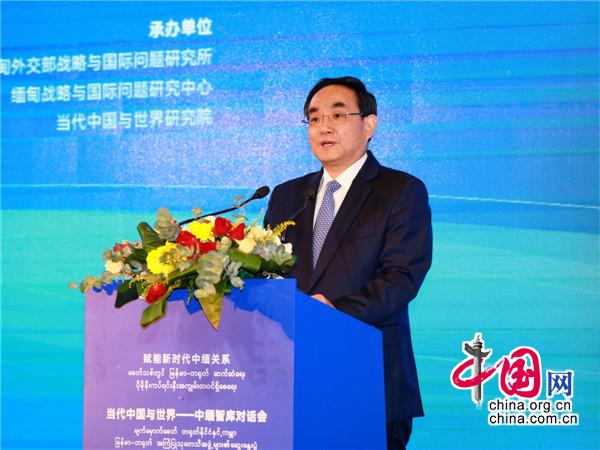



A think tank dialogue event exploring relationships and cooperation between China and Myanmar was held on Tuesday in Yangon, Myanmar.

The "Contemporary China and the World – China-Myanmar Think Tank Dialogue" event was co-sponsored by the State Council Information Office of China, the Ministry of Foreign Affairs of Myanmar, the China International Publishing Group (CIPG), and Chinese Embassy to Myanmar, and organized by the Academy of Contemporary China and World Studies, Myanmar Institute of Strategic and International Studies and the Center for Strategic and International Studies of Myanmar.
More than 240 dignitaries, experts and scholars from China and Myanmar attended the event, the theme of which was "Empowering China-Myanmar Relations in the New Era."
Xu Lin, deputy head of the Publicity Department of the Communist Party of China (CPC) Central Committee and director of the State Council Information Office of China, said that China and Myanmar are closely connected in terms of geography, peoples and cultures.
He stated: "This year marks the 70th anniversary of the establishment of diplomatic relations between China and Myanmar. President Xi Jinping's forthcoming state visit to Myanmar is of great significance to further consolidating the friendship between China and Myanmar and promoting the in-depth development of our comprehensive strategic cooperative partnership."
Xu also pointed out that think tanks in the two countries should be proactive, focus on enhancing strategic mutual trust, promote mutually beneficial cooperation, underline the promotion of people-to-people communication and further deepen exchanges and cooperation, while carrying out basic, strategic and innovative research. He added that they should also give increased momentum to China-Myanmar relations in the new era, deepen the relationship between the two countries, and support the development and continual steady progression of relations.
He added that in the 70 years since the founding of the People's Republic of China, China has created a miracle of rapid economic development and long-term social stability that is rare throughout the world. The reason for its success lies in five key elements: a development path in line with national conditions, a strong ruling party, a people-oriented development concept, an effective system that works well, and the basic national policy of reform and opening-up.
U Kyaw Tin, union minister for international cooperation of Myanmar, said that there is a long history of friendship between Myanmar and China, and that the two countries will work together to strengthen cooperation, to co-exist peacefully and to further develop friendly relations.
"The Belt and Road Initiative proposed by President Xi Jinping is a great idea," he said. "If both Myanmar and China adhere to the principles of consultation, contribution and shared benefits, the governments' actions will definitely benefit the people of both countries."
He stressed that Myanmar and China must strengthen exchanges and cooperation not only between governments, but also at all levels and in all areas. Among them, experts, scholars and research institutions can provide good suggestions through research and surveys, and play an important role in enhancing understanding between the two peoples.
"The dialogue was a good start. Scholars summarized and reviewed historical experience and provided recommendations for the vigorous development of Myanmar-China relations in the new era," U Kyaw Tin said. It is his belief that through joint efforts and strengthening exchanges between the two peoples, the deep foundation of friendship between the two countries will be consolidated.
Du Zhanyuan, president of CIPG, also pointed out that the world today is undergoing major changes not seen in a century, and the international situation is becoming increasingly complex and changeable.
"In the new situation, China and Myanmar, as friendly neighbors, must enhance their strategic determination, trust each other, strengthen cooperation, and achieve mutual benefits," he stated.
Du also called for think tanks in the two countries to play a positive role as "opinion leaders," deepen exchanges and cooperation, conduct joint research around issues of common concern, produce more targeted research, and provide important decision-making references for the leaders of the two countries. This will better serve the overall situation of friendly relations between China and Myanmar, better serve the cause of cooperation and development between the two countries, and better serve world peace and the common progress of mankind.
Later, senior Chinese and Myanmar officials, as well as experts and scholars from the two countries took part in discussions at a seminar. They spoke about and exchanged ideas on topics including how to enhance mutual political trust and deepen strategic cooperation between the two countries, as well as poverty reduction experiences, jointly building Belt and Road projects, and deepening cultural exchanges. Participants agreed that it is necessary to promote the exchange and mutual learning of the governance experience of China and Myanmar, strengthen exchanges and cooperation in various fields and at all levels, and thus promote development and common prosperity.
